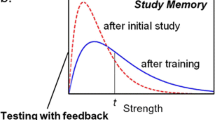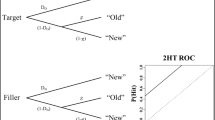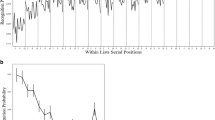Abstract
In a series of four experiments, recall and recognition performance were examined following recall and recognition instructions. It was found that recall-instructed subjects produced significantly better performance than recognition-instructed subjects on tests of ordered and free recall of words, particularly on the early part of the list (Experiments 1 and 2). The results of two further experiments suggest that this is mediated by differences occurring at input, and is due to increased rehearsal by subjects expecting a recall test (Experiments 3 and 4).
Similar content being viewed by others
References
Anderson, J.R. & Bower, G.H. (1972). Recognition and retrieval processes in free recall. Psychological Review, 79, 97–123.
Bahrick, H.P. (1969). Measurement of memory by prompted recall. Journal of Experimental Psychology, 79, 213–219.
Bahrick, H.P. (1979). Broader methods and narrower theories for memory research. In L.S. Cermak & F.I.M. Craik (eds.), Levels of Processing in Human Memory. Hillsdale, N.J.: Erlbaum.
Bruce, D. & Fagan, R.L. (1970). More on the recognition and free recall of organized lists. Journal of Experimental Psychology, 85, 153–154.
Dale, H.C.A. (1966). When recognition is no better than recall. Nature, 211, 324.
d’Ydewalle, G. (1979). Test expectations in free recall and recognition. Paper presented at the London Conference of the British Psychological Society, December 1979.
Estes, W.K. & Dapolito, F. (1967). Independent variation of information storage and retrieval processes in paired-associate learning. Journal of Experimental Psychology, 75, 18–26.
Fischler, I., Rundus, D. & Atkinson, R.C. (1970). Effects of overt rehearsal procedures on free recall. Psychonomic Science, 19 (4), 249–250.
Hall, J.F. (1954). Learning as a function of word frequency. American Journal of Psychology, 67, 138–140.
Hall, J.W., Grossman, L.R. & Elwood, K.D. (1976). Differences in encoding for free recall vs. recognition. Memory and Cognition, 4 (5), 507–513.
Hall, J.W., Miskiewicz, R. & Murray, C.G. (1977). Effects of test expectancy (recall vs. recognition) on children’s recall and recognition. Bulletin of the Psychonomic Society, 10 (5), 425–428.
Hasher, L. & Zacks, R.T. (1979). Automatic and effortful processes in memory. Journal of Experimental Psychology: General, 108, 356–388.
Kintsch, W. (1968). Recognition and free recall of organized lists. Journal of Experimental Psychology, 78 (3), 481–487.
Kintsch, W. (1970). Models for free recall and recognition. In D.A. Norman (ed.), Models of Human Memory. New York: Academic Press.
Kucera, H. & Francis, W.N. (1967). Computational analysis of Present Day American English. Providence, Rhode Island: Brown University Press.
Loftus, G. (1971). Comparison of recognition and recall in a continuous memory task. Journal of Experimental Psychology, 91 (2), 220–226.
Maisto, S.A., DeWaard, R.J. & Miller, M.E. (1977). Encoding processes for recall and recognition: The effect of instructions and auxiliary task performance. Bulletin of the Psychonomic Society, 9 (2), 127–130.
Shephard, R.N. (1967). Recognition memory for words, sentences and pictures. Journal of Verbal Learning and Verbal Behaviour, 6, 156–163.
Thorndike, E.L. & Lorge, I. (1944). The Teacher’s Word Book of 30,000 Words. New York: Columbia University Teachers College, Bureau of Publications.
Tulving, E. (1976). Ecphoric processes in recall and recognition. In J. Brown (ed.), Recall and Recognition. London: Wiley.
Von Restorff, H. (1933). Uber die Wirkung von Bereichs bildungen im Spurenfeld. Psychologische Forschung, 18, 299–342.
Zimmerman, J. & Underwood, B.J. (1968). Ordinal position knowledge within and across lists as a function of instructions in free-recall learning. Journal of General Psychology, 79, 301–307.
Author information
Authors and Affiliations
Rights and permissions
About this article
Cite this article
Lewis, K., Wilding, J. Influences of test expectations on memory-processing strategies. Current Psychological Research 1, 61–74 (1981). https://doi.org/10.1007/BF02684427
Accepted:
Published:
Issue Date:
DOI: https://doi.org/10.1007/BF02684427




